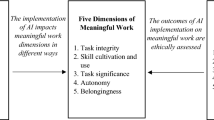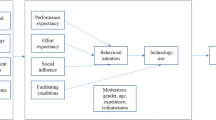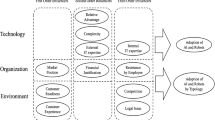Abstract
For quite some time, the research in artificial intelligence has focused on expert systems, because here are to be found practical applications at the experimental stage which may soon become widespread. This focus makes more pressing the need to link the debate about the fundamental efficiency of artificial intelligence with those activities that aim at the application of specialized expert systems. In this paper, I begin by considering the stages and the development of human expertise. As a frame of reference I propose a polar dialectic model of the development of human acting and thinking that explicitly deals with the interplay of calculating rationality and intuition. This suggests the use of expert systems as decision aids particularly in the field of maintenance work on the shop-floor. With regard to this case, some theses concerning the human-centred shaping of technology and work are presented.
Similar content being viewed by others
References
Bernold, T. and G. Albers (1985).Artificial Intelligence: Towards Practical Application. Elsevier Science Publishers, Amsterdam.
Berry, D.C. (1988). The Problem of Implicit Knowledge. In Göranzon (ed.)Culture, Language and Artificial Intelligence, Preparing Papers. Arbetslivscentrum, Stockholm.
Böhle, F. and B. Milkau (1988).Vom Handrad zum Bildschirm. Eine Untersuchung zur sinnlichen Erfahrung im Arbeitsprozeß. Campus, Frankfurt, New York.
Brauer, W. and W. Wahlster (eds.) (1987).Wissensbasierte Systeme. 2. Internationaler GI-Kongreß München. Springer-Verlag, Berlin Heidelberg New York.
Brödner, P. (1986).Fabrik 2000. Alternative Entwicklungspfade in die Zukunft der Fabrik. Edition Sigma, Berlin.
Cooley, M. (1988). Creativity, Skill and Human-Centred Systems. In Göranzon (ed.)Culture, Language and Artificial Intelligence, Preparing Papers. Arbetslivscentrum, Stockholm.
Dreyfus, H.L. (1985).What Computers Can't Do: The Limits of Artificial Intelligence. Harper & Row, New York.
Dreyfus, H.L. and S.E. Dreyfus (1986).Mind over Machine. The Free Press, New York.
Gullers, P. (1988). Automation — Skill — Apprenticeship. In Göranzon and Josefson (eds.)Knowledge, Skill and Artificial Intelligence. Springer-Verlag, London Berlin Heidelberg.
Hegel, G.W.F. (1807/1973).Phänomenologie des Geistes. Ullstein, Frankfurt.
Heidegger, G. (1987).Dialektik und Bildung. Widersprüchliche Strukturierungen in Kognition und Emotion. Juventa, Wëinheim and München.
Heidegger, G. (1988). Gestaltung von Arbeit und Technik am Arbeitsplatz. Perspektiven für die berufliche Bildung. In Heidegger, Gerds, Weisenbach (eds.).Gestaltung von Arbeit und Technik — Ein Ziel beruflicher Bildung. Campus, Frankfurt, New York.
Heims, S.J. (1988). Optimism and Faith in Mechanism among Social Scientists at the Macy Conferences on Cybernetics, 1946–1953.AI & Society. 2. 69–78.
Hofstadter, D.R. (1979).Gödel, Escher, Bach: An Eternal Golden Braid. Basic Books, New York.
Johannessen, K.S. (1988). The Concept of Practice in Wittgenstein's Later Philosophy. In Göranzon (ed.)Culture, Language and Artificial Intelligence, Preparing Papers. Arbetslivscentrum, Stockholm.
Luhmann, N. (1984).Soziale Systeme. Grundriß einer allgemeinen Theorie. Suhrkamp, Frankfurt.
Lyotard, J.-F. (1983).Le Différend. Éditions de Minuit, Paris.
MacKenzie, D. and J. Wajcman (1985).The Social Shaping of Technology. How the refrigerator got its hum. Open University Press, Milton Keynes.
Minsky, M. (1987).The Society of Mind. Heinemann, London.
Östberg, O. (1988). Applying Expert Systems Technology. In Göranzon (ed.)Culture, Language and Artificial Intelligence, Preparing Papers. Arbetslivscentrum, Stockholm.
Piaget, J. (1976).Die Āquilibration der kognitiven Strukturen. Klett-Cotta, Stuttgart.
Piaget, J. (1980).Les formes élémentaires de la dialectique. Éditions Gallimard, Paris.
Polanyi, M. (1966).The Tacit Dimension. Doubleday, Garden City, New York.
Pritchard, P. (1988). Knowledge-Based Computer Decision-Aids for General Practice. In Göranzon and Josefson (eds.)Knowledge, Skill and Artificial Intelligence. Springer-Verlag, London Berlin Heidelberg.
Rauner, F. (1988). Die Befähigung zur (Mit)Gestaltung von Arbeit und Technik als Leitidee beruflicher Bildung. In Heidegger, Gerds and Weisenbach (eds.)Gestaltung von Arbeit und Technik — Ein Ziel beruflicher Bildung. Campus, Frankfurt, New York.
Rauner, F., Rasmussen, L. and J.M. Corbett (1988). The Social Shaping of Technology and Work: Human-Centred CIM Systems.AI & Society. 2. 47–61.
Ruth, K. (1988). Skill Transfer or Power Transfer? The role of the transfer of skill and knowledge in designing CNC-machine tools.AI & Society. (in press).
Savory, S. (1985). A Nixdorf Expert System for Fault-Finding and Repair Planning — An Outline Description. In Bernold and Albers (eds.)Artificial Intelligence: Towards Practical Application. Elsevier Science Publishers, Amsterdam.
Schank, R.C. and R.P. Abelson (1977).Scripts, Plans, Goals, and Understanding. Hillsdale, New Jersey.
White, I. (1988). W(h)ither Expert Systems? — A view from outside.AI & Society. 2. 69–78.
Author information
Authors and Affiliations
Rights and permissions
About this article
Cite this article
Heidegger, G. Human experts and expert systems: A view from the shop-floor. AI & Soc 3, 47–57 (1989). https://doi.org/10.1007/BF01892675
Issue Date:
DOI: https://doi.org/10.1007/BF01892675




